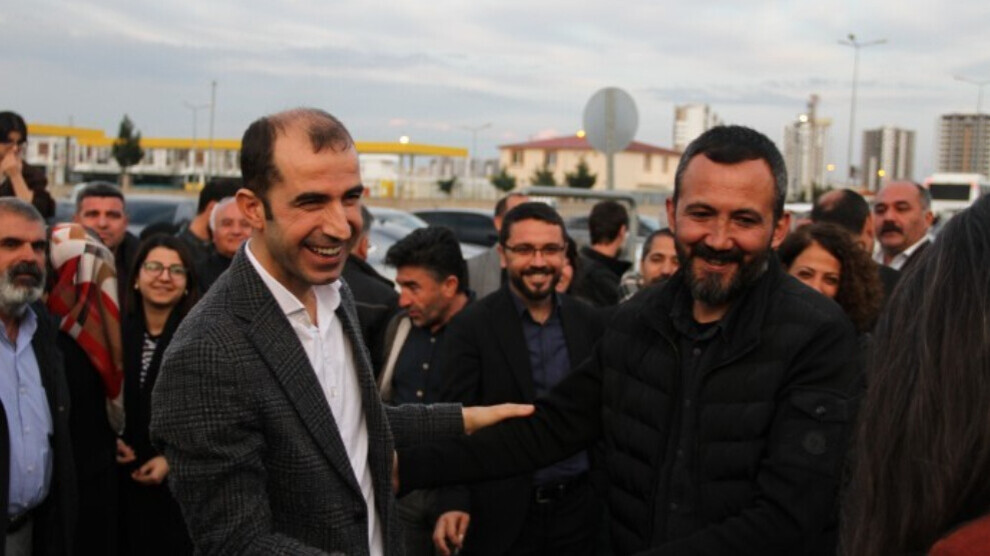DBP Co-Chair Keskin Bayındır released from prison
DBP Co-Chair Keskin Bayındır is on trial in Amed on terror charges, facing up to 15 years imprisonment. At the start of the trial, the Kurdish politician was surprisingly released from prison.
DBP Co-Chair Keskin Bayındır is on trial in Amed on terror charges, facing up to 15 years imprisonment. At the start of the trial, the Kurdish politician was surprisingly released from prison.

A Turkish court in Amed (tr. Diyarbakır) has ordered the release of Kurdish politician Keskin Bayındır from pre-trial detention. However, the trial against the co-chairman of the Democratic Regions Party (DBP) will continue, the lawyers announced on Wednesday. A date for the next hearing has not yet been set.
Bayındır was detained in Amed last December after a nationwide raid and searches of DBP representations in nine cities and was subsequently remanded in custody. The Turkish judiciary accuses the 39-year-old politician of "membership of an armed terrorist organisation" - meaning the Kurdistan Workers' Party (PKK). If convicted, he faces a prison sentence of up to 15 years.
The prosecutor relied on allegations, speculation and conjecture in the indictment. He has no real evidence, and his accusations are primarily directed against the DBP, whose declared goal is to represent the interests of the Kurdish population and decentralise Turkey, Bayındır's defence argues. Most of the "circumstantial evidence" is based on statements by alleged witnesses, only a few of whom are known by name. One of them allegedly stated to the police that the DBP operated as a "recruitment office" for the PKK.
Another witness, according to the police, said that the DBP, a sister party of the HDP, which is threatened with a ban, supported the "goal" of the Kurdistan Communities Union (KCK, the umbrella organisation of the Kurdish liberation movement, to which the PKK also belongs) to establish an independent Kurdish state. The "efforts for this perspective" are allegedly implemented in the party headquarters in Amed, despite the fact that the PKK is not calling for a state for the Kurdish people but advocates political self-government and cultural co-existence based on its paradigm of a democratic nation.
At today's start of the trial, Keskin Bayındır vehemently rejected the accusations against him and his party, stating that the proceedings were being conducted without any legal basis and basically reflected the attitude of the Turkish judiciary towards the Kurdish question, which was being tackled exclusively with violence in Turkey. He said that it was not his political actions and the actions of his party that were legally illegitimate, but the attacks by the judiciary and law enforcement agencies on basic democratic rights. "The accusations made against me are beyond reason and logic. In particular, the allegation that I took part in banned actions is absurd," the politician said.
Bayındır thus alluded to the participation in a total of fourteen events that have been reclassified as terrorist activities in the indictment against him. These include public press statements against arrest operations of members of Kurdish civil society, the dismissal from office and arrest of former HDP MPs Leyla Güven and Musa Farisoğulları, an event in commemoration of the more than one hundred people killed in the ISIS attack on a peace rally in Ankara in 2015, and conferences of the HDP and the Kurdistan Alliance. Interviews given by Bayındır as DBP co-chairman, for example on the unresolved Kurdish question and the isolation of Abdullah Öcalan on the prison island of Imrali, are also taken as evidence of his alleged PKK membership.
"All these incriminated events were demonstrably legal, thus my participation does not constitute a criminal offence," Bayındır emphasised at the end of his defence speech. The public prosecutor's office demanded the continuation of pre-trial detention without giving reasons. The court did not comply with the request and ordered the release of the politician. After the trial, Keskin nevertheless had to return to the local prison, where the final formalities for his release were completed. He then left the prison and was greeted by a large crowd. It is not yet clear when the trial against him will continue.